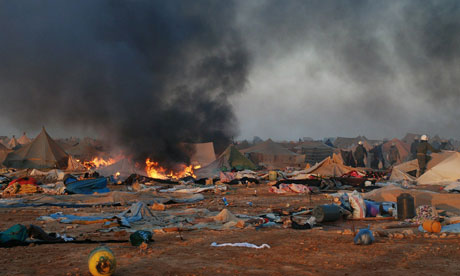Morocco must answer for human rights abuses in Western Sahara | Brahim Dahane| guardian.co.uk

Moroccan forces dismantle the protest camp near Laayounce in 2010. Photograph: AFP/Getty Images
Two years ago this week, just outside my home town of Laayounne in Western Sahara, in the early hours of the morning, Moroccan police and bulldozers moved in to destroy a protest camp called Gdeim Izik.
The camp was a peaceful manifestation of the frustration felt by theSahrawi people over the poor living conditions, discrimination and human rights abuses they suffer in their homeland, occupied by Morocco for 37 years – and a demand for the long-awaited referendum on independence.
The brutal destruction of the camp resulted in dozens of deaths, imprisonments, injuries and forced disappearances. Noam Chomsky later went on to describe these protests as the beginning of the Arab spring. I would have been at Gdeim Izik myself had I had not been in prison, accused of "harming state security" along with six other Sahrawi activists.
Two years later, 23 of those arrested are languishing in the notorious Sale prison near Rabat, awaiting trial. During their imprisonment they have experienced torture, ill-treatment and even rape, and have organised several hunger strikes – some lasting as long as 50 days. In fact, they have just finished their latest three-day hunger strike in protest against the trial being postponed, conditions in the prison, and the recent violent police action across the occupied territory.
Many of the prisoners are in a bad way, physically and psychologically. Several are suffering from severe stomach, cardiac and kidney problems. I know only too well what they have to endure, having been imprisoned myself three times. During one stay in prison I spent four years blindfolded and handcuffed, forced to stand all day against a wall. We experienced all kinds of torture and humiliation. It was hell. The Moroccan authorities do everything they can to break your spirit and destroy your dignity. But my spirit is not broken.
A couple of weeks ago I travelled with some colleagues to Rabat to attend the trial of the prisoners, which was due to take place on 24 October, postponed from 13 January. Even though all the defendants are civilians, the trial was to take place in a military court, contravening international law. However, the Moroccan authorities announced they had postponed the trial again. No future date has been given.
No doubt the presence of Sahrawi human rights defenders and international observers and journalists played a major part in this decision. The Moroccan authorities are running scared. They have got themselves in a mess with this case and don't know what to do to get out of it. We were disappointed that the trial was postponed but at least it shows that civil society and political pressure is working.
Along with the families of the prisoners, Sahrawi human rights defenders and international observers, I took part in a demonstration outside the military court at the very time the trial should have taken place. Largely thanks to the presence of the observers, the police did not react with violence. Sadly, this was not the case in Laayounne, where police responded to protests about the trial being postponed with customary violence, badly injuring many protesters.
Feelings are running high about the fate of the 23 prisoners, many of whom were arrested for their role as activists, not for committing any crimes. The prisoners were charged arbitrarily with, among other accusations, "acting against internal and external state security, creation of a criminal organisation and acting against public officials in the performance of their functions". According to Moroccan law, they could be sentenced to life imprisonment.
I'm deeply concerned for the wives and children of the prisoners who are out of their minds with worry, not knowing when this will end. They know their family members are suffering in prison, but are unable to do anything about it.
The Moroccan authorities should immediately release the 23 Gdeim Izik prisoners – without any conditions. None of them did any more than attend a protest. The disregard the Moroccan authorities have shown the prisoners and their families is indicative of the occupation as a whole. They are not the only ones. The "group of Dakhla" – prisoners jailed for taking part in a peaceful protest in the coastal town of Dhakla – have also experienced torture and ill-treatment.
The Moroccan authorities contravene national and international law with impunity. Last week, they broke up demonstrations in Laayounne, Dhakla and Smara during the UN special envoy's visit, ransacking activists' homes and beating and torturing protesters.
Morocco's occupation of Western Sahara is unlawful, and we will continue to fight it despite the behaviour of the Moroccan authorities towards us. We hope the rest of the world will join us in solidarity.






0 comments: